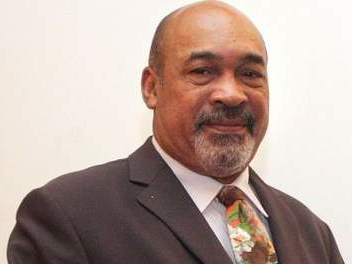Suriname is facing an economic crisis that has seen swingeing inflation and deepened by slumping commodity prices, according to an Associated Press (AP) report.
AP said that Suriname President Desi Bouterse is contemplating withdrawing from a US$478m loan arrangement sealed with the International Monetary Fund (IMF) in May and seeking aid instead from the Islamic Development Bank.

The Guyana Govern-ment would likely be watching the situation carefully as an economic crisis across the border could see Suriname-based Guyanese returning in large numbers.
The IMF expects the Surinamese economy to contract 2 percent this year and AP said that Paramaribo’s Bureau of Statistics says inflation is running at an annualized 64 percent, up from an average 4 percent in 2013-2015.
The falling prices for Suriname’s main exports, gold and oil, and last year’s closure of the Alcoa aluminum refinery have been cited by AP as the major causes of the economic plight. It said that Bouterse likely also contributed by spending heavily before the May 2015 election, eating up currency reserves.
The AP report said that Bouterse has frozen retail fuel prices and pulled back from energy price increases, against the IMF’s budget-protecting recommendations. He has also vowed to stabilise the exchange rate of the Surinamese dollar, which has fallen by more than half against the U.S. dollar in the past year.
AP reported that Bouterse at a news conference on Tuesday said that the IMF requirements are “very harsh” and that his government may move to withdraw from the loan agreement.
Cold
“The IMF is cold and only thinks about the numbers and the deadlines we had agreed to,” Bouterse said. “If the agreement with the IMF becomes too difficult to follow, if we risk becoming victims of the agreement ourselves, we will have to look for other options.”
Following its assessment mission last month, the IMF had pointed to the mixed results in Paramaribo following the US$478m loan agreement.
A release following the visit said: “The IMF mission had constructive discussions with the authorities on policies needed to meet the objectives of Suriname’s economic programme supported by the SBA (Stand-By Arrangement). We agreed with the authorities to continue discussions with a follow-up visit once further progress has been made in implementing the program.
“Performance under the programme has been mixed. The government has kept the fiscal deficit close to the programmed path by restraining spending, and the authorities implemented a number of the planned reforms, including preparations for the introduction of the value added tax. However, the decisions to freeze fuel pump prices and partially reverse the increase in electricity prices, despite rising energy costs, have significantly reduced available government resources, and spending on social cash transfers has undershot envisaged levels. Finally, the limited nominal interest rate increases, despite a substantial rise in inflation, pose a risk to price stability.
“Restoring macroeconomic stability will require great efforts from the Surinamese authorities as well as society as a whole. The decision in recent days to support tax revenues by assessing customs duties at the market exchange rate, and the restoration of SRD 0.2 in taxes per liter of fuel, are steps in the right direction. Nevertheless, significant additional increases in fuel taxes and electricity tariffs, as planned in the programme, are essential to improve the fiscal situation and make space for better-targeted social spending.
“On the monetary policy front, supporting a rise in local currency interest rates to positive levels in real terms is essential for stabilizing prices and exchange rate expectations, including through the use of the Central Bank of Suriname’s upgraded monetary policy toolkit. Maintaining a flexible exchange rate remains vital to achieving the program’s reserve accumulation objectives”.
AP said that health care has been hit particularly hard. Doctors at the Academic Hospital Paramaribo, the country’s largest, recently posted a YouTube video pleading for help from Surinamese living abroad, saying they lacked essential things as sterile tubes. “We have reached the point that people will die an avoidable death,” one said.
Manodj Hindori, chairman of the National Hospital Council, was reported by AP as saying that all of the country’s hospitals “are on the verge of bankruptcy” because of higher prices for supplies combined with reduced government subsidies.
AP said that recent polls say Bouterse’s popularity rating is now around 17 percent, about that of President Nicolas Maduro, the socialist leader in struggling Venezuela.
It reported Economy Minister Gillmore Hoefdraad as saying the economic crisis is temporary and the situation will improve when gold and oil prices recover. The government expects its budget will get a boost when U.S.-based Newmont Mining Corp. starts production at a new mine later this year.
The Association of Economists of Suriname says the government must diversify economically and produce more than just oil and gold.
In May following the loan agreement, the IMF had said that the programme supported by the arrangement aims to facilitate Suriname’s adjustment to the fall in the prices of major commodity exports, restore confidence, and pave the way to economic recovery. It said that a critical ingredient of the programme is fiscal consolidation, to restore fiscal and external current account stability. The programme also covered reforms to the exchange rate and monetary policy framework, to enhance Suriname’s resilience to the current and to possible future shocks, and allow a steady rebuilding of foreign reserves.
The IMF had also said Suriname has been hit hard by the closure of the country’s alumina production. In 2011, revenues from the sale of oil, gold and bauxite accounted for 88 percent of exports and 40 percent of government revenue.
“The subsequent price declines and the closure of alumina refinery Suralco in late-2015 have cut these revenues and caused substantial fiscal and external current account deficits. The fiscal deficit reached 8.8 percent of GDP in 2015, compared with a small surplus in 2011, with the bulk of the worsening reflecting the drop in government mineral revenue. The current account has worsened from a surplus of 5.7 percent of GDP in 2011 to a deficit of 15.6 percent of GDP in 2015 due to the drop in mineral exports”, the IMF had stated.








